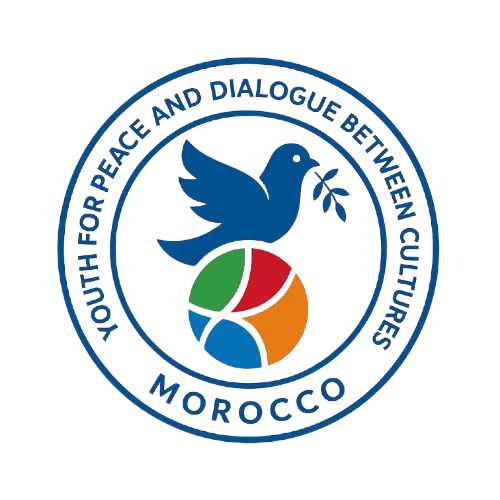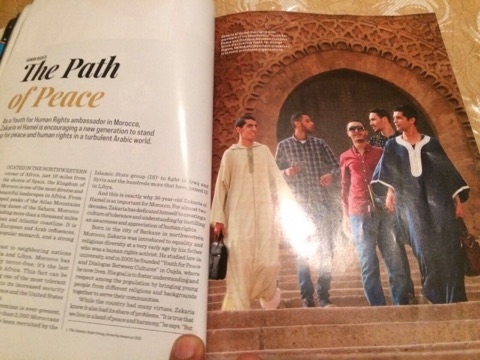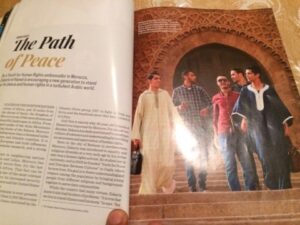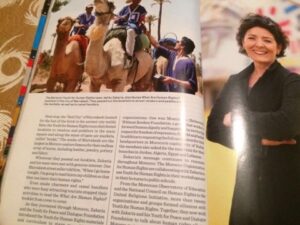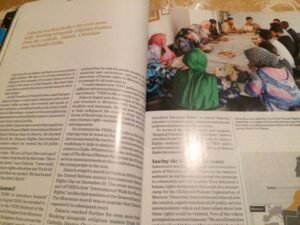The Path of Peace
As a Youth for Human Rights ambassador in Morocco
Zakaria el Hamel is encouraging a new generation to stand
Up for peace and human rights in turbulent Arabic world.
LOCATED IN THE NORTHWESTREN corner of Africa, just 10 miles from the shores of Spain, the Kingdom of Morocco is one of the most diverse and beautiful landspaces in Africa. From the snowcapped peaks of the Atlas Mountains to the sweeping dunes of the Sahara, Morocco has it all-including more than a thousand miles of Mediterranean and Atlantic coastline. It is a country with European and Arab influences, a powerful and popular monarch, and a strong Islamic base.
In stark contrast to neighboring nations of Algeria, Tunisia and Libya, Morocco has remaind relatively terror-free ; it’s the last safe haven in North Africa. This fact can be attributed to it being one of the most tolerant Muslim nations and to its increased security efforts with Spain, France and the United States to fight global terrorism.
Yet the threat of extremism is ever-present, as evidenceed by the more than 2,000 Moroccans that Interpol claims have been recruited by the
Islamic State group (IS) to-fight in Iraq and Syria and the hundreds more that have joined IS in Libya.
And this is exactly why 36-years old Zakaria el Hamel is so important for Morocco.For almost two decades, Zakaria has dedicated himself to creating a culture of tolerence and understanding by instilling an awareness and appreciation of humman rights.
Born in the city of Berkane in northwestren Morocco, Zakaria was introduced to equality and religious diversity at a very early age by his father who was a human rights activist. He studied law in university, and in 2005 he founded ‘‘Youth for Peace and Dialogue Between Cultures’’ in Oujda, where he now lives. His goal is to foster understanding and respect among the population by bringing young people from different religions and backgrounds toghether to serve their communities.
While the country had many virtues, Zakaria knew it also had its share of problems. ‘‘it is true that we live in a land of peace and harmony,’’ he says. ‘‘But
Zakaria reached further for even more
Help : Working alongside religious leaders
From the Catholic, Islamic, Christian and Methodist faiths.
a lot of youth are jobless and there are many human rights abuses. We have a lot of discrimination in Morocco. For example, if you don’t dress well and you go to the court or to the hospital, they don’t take care of you and will throw you out because you don’t have money.’’
As the President of youth for Peace and Dialogue, Zakaria began to meet and collaborate with active human rights groups. He traveled and spoke at international conventions such as the Anna Lindh Forum in Barcelona – a major civil society gathering of representatives from Mediterranean countries to promote intercultural action.
In late 2009, Zakaria saw a notice that caught his eye : a Youth for Human Rights International Summit at the United Nations base in Geneva. He checked out the Youth for Human Rights International (YHRI) website where he viewed the 30 public service announcements.
‘‘the first video ‘ We are all born free and equal’ was just magic when I watched it the first time. That’s what touched my heart,’’ says Zakaria. ‘‘I was really interested in human rights education and Youth for Human Rights had what we needed. We had looked for this in the past but didn’t find it.’’
The Geneva Summit
Zakaria contacted YHRI to introduce himself and his foundation. In August 2010, he traveled to Geneva and took part in the YHRI Summit at the United Nations as the Youth Delegate from Morocco.
There, he met Youth Delegates from across the world and watched them present results of their activities from the previous year. Zakaria quickly
realised that he and his people needed the YHRI materials and curriculum – not just to promote awareness of human rights in Morocco, but to set an example for all Arab nations.
‘‘I really admire how YHRI gathers youth from different cutures and faiths for peace and tolerance,’’ says Zakaria. ‘‘YHRI is like a family to me.’’
Zakaria forged new friendships at the summit and returned to Morocco with boxes of YHRI booklets and materials. He had new inspiration to help safeguard the country from the rising threat of fanaticism in nearby lands by promoting every human right – including freedom of religion and expression.
He presented the YHRI materials to the leaders of groups that he knew in Oujda and other cities. He also incorporated the curriculum in his lectures and workshops to kids in elementary schools and youth centers in Oujda. Wherever he spoke, he handed out a copy of The Story of Human Rights and 30 public service announcements so they could show these to the young people in the area.
Zakaria staged a march in Oujda in 2010 to mark the United Nations annual International Human Rights Day on December 10. The event was held as part of YHRI’s first ‘‘International Walk for Human Rights,’’an idea that was born at the Geneva Summit. The Moroccan march was so popular that Zakaria repeated it in subsequent years.
Zakaria reached futher for even more help : Working alongside religious leaders from the Catholic, Islamic, Christian and Methodist faiths, Zakaria next staged an interfaith event in the Saint Louis Church in Oujda. This celebrated ‘‘World
Interfaith Harmony Week’’- a United Nations initiative to increase peace, tolerance and mutual understanding between different faiths.
To forward the event’s theme and purpose, ‘‘Stopping Violence in the Name of Religion,’’ Zakaria introduced participants to the Youth for Human Rights campaign and played the YHRI public service announcement and The Story of Human Rights documentary.
Sowing the Seeds of Tolerence
Zakaria and memberes of his team moved on to other parts of Morocco. In Casablanca on the westren seaboard, he and his team presented the campaign to community and city leaders. They deliveredd a human rights workshop to 200 youth at a summer camp for Children Pioneer Organisation of Morocco. These kids, from towns and cities all over the country, eagerly watched all 30 public service announcement videos and then talked about how these rights could be violated. Two of the videos prompted an excited response : ‘‘We are all born free and equal’’ and ‘‘A fair and free world.’’ In fact, when the kids took part in a short human rights walk after the workshop, they spontaneously chanted, ‘‘ We want a fair and free world.’’
Zakaria presented the Youth for Human Rights materials to leaders of schools and groups throughout Morocco, including a presentation to the leaders of the group Youth for Peace.
Next stop : the ‘‘Red City’’ of Marrakesh (named for the hue of the brick in the ancient city walls). Here, the Youth for Human Rights team distributed booklets to vendors and peddlers in the main square and along the maze of open-air markets, called ‘‘souks.’’ The souks of Marrakesh are the largest in Morocco and are famous for their endless array of wares, including leather, jewelry, pottery and fabric.
Wherever they passed out booklets, Zakaria and his team were met with genuine interest. One Marrakesh street seller told him, ‘‘When I go home tonight, I’m going to read this to my children so that they can learn their human rights.’’
Even snake charmers and camel handlers who were busy attracting tourits stopped their activities to read the What Are Human Rights ? booklet from cover to cover.
As they journeyed through Morocco, Zakaria and the Youth for Peace and Dialogue Foundation introduced the Youth for Human Rights materials and curriculum to many more like-minded
organisations. One was Mominoun (Believers Without Borders Foundation, a group that works to forward human dignity and happiness by nurturing respect for freedom of expression, thought and belief. In addition to requesting the full curriculum for their headquarters in Morocco’s capital city of Rabat, the members also asked for the materials for their branches in Jordan, Algeria, Egypt and Lebanon.
Zakaria’s message continues to resonate throughout Morocco : The Morocco Organisation for Human Rights are collaborating with Zakaria to use Youth for Human Rights in their workshops and in their lectures to public schools.
From the Moroccan Observatory of Education and the National Council on Human Rights to the United Religions Initiative, more than twenty organisations and groups formed alliances with Youth for Human Rights. Together, they now work with Zakaria and his Youth for Peace and Dialogue Foundation to talk about Human rights all over Morocco, maintaining the long tradition of peace and tolerance in this North African Kingdom.
